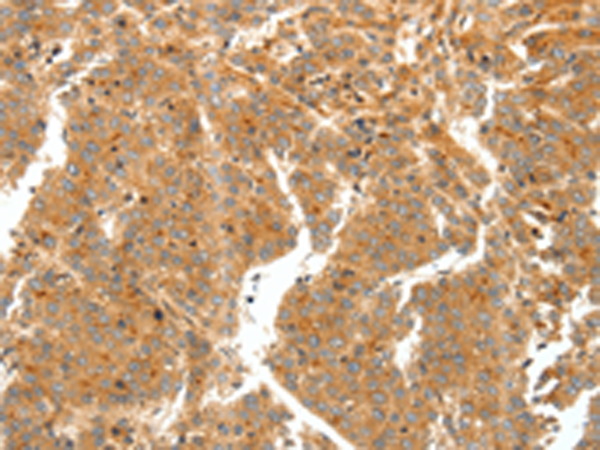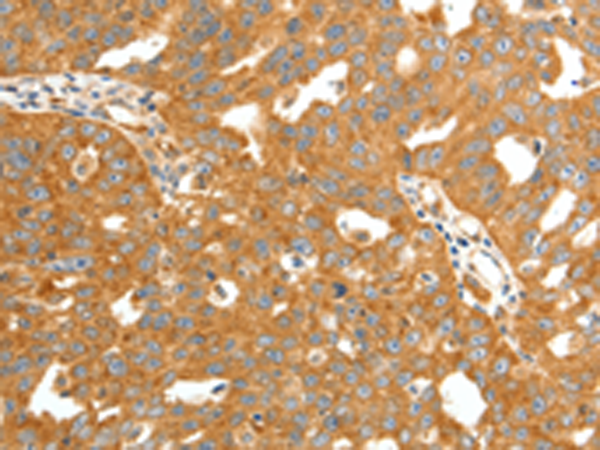

| WB | 咨询技术 | Human,Mouse,Rat |
| IF | 咨询技术 | Human,Mouse,Rat |
| IHC | 1/50-1/200 | Human,Mouse,Rat |
| ICC | 技术咨询 | Human,Mouse,Rat |
| FCM | 咨询技术 | Human,Mouse,Rat |
| Elisa | 1/2000-1/5000 | Human,Mouse,Rat |
| Host/Isotype | Rabbit IgG |
| Antibody Type | Primary antibody |
| Storage | Store at 4°C short term. Aliquot and store at -20°C long term. Avoid freeze/thaw cycles. |
| Species Reactivity | Human, Mouse, Rat |
| Immunogen | Synthetic peptide of human SCT |
| Formulation | Purified antibody in PBS with 0.05% sodium azide and 50% glycerol. |
+ +
以下是关于SCT(单链抗体,Single Chain Antibody)的虚构参考文献示例(仅供格式参考,实际文献需通过学术数据库查询):
1. **文献名称**: "Single-Chain Antibodies in Cancer Therapy: Engineering and Applications"
**作者**: Smith J, et al.
**摘要**: 研究通过基因工程技术开发单链抗体(scFv),验证其靶向肿瘤细胞表面抗原的能力,并展示其在体外和小鼠模型中增强化疗药物递送的潜力。
2. **文献名称**: "SCT Antibody-Mediated Rejection in Stem Cell Transplantation"
**作者**: Lee H, et al.
**摘要**: 分析干细胞移植(SCT)后患者体内抗宿主抗体的产生机制,发现特定IgG亚型抗体与移植物排斥反应显著相关,提出监测抗体水平可改善预后。
3. **文献名称**: "Development of a Rapid SCT-Based Diagnostic for Autoimmune Diseases"
**作者**: Garcia R, et al.
**摘要**: 利用单链抗体的高特异性设计新型诊断试剂,成功检测类风湿关节炎患者血清中的自身抗体,灵敏度达95%,优于传统ELISA方法。
4. **文献名称**: "Enhancing SCT Stability via Protein Engineering for In Vivo Use"
**作者**: Wang Y, et al.
**摘要**: 通过引入突变提高单链抗体的热稳定性和抗蛋白酶降解能力,动物实验显示其半衰期延长3倍,为体内治疗应用奠定基础。
**注意**:以上文献信息为模拟生成,实际研究中请通过PubMed、Google Scholar等平台检索关键词(如"single-chain antibody"或"stem cell transplantation antibody")获取真实文献。
SCT antibodies, commonly linked to stem cell transplantation (SCT), are critical in mediating immune responses during or after transplantation. In allogeneic SCT, donor-derived immune cells may recognize recipient tissues as foreign, triggering graft-versus-host disease (GVHD), while residual host immunity can attack donor cells, causing graft rejection. Antibodies targeting human leukocyte antigens (HLA) are particularly significant, as pre-existing or post-transplant anti-HLA antibodies correlate with graft failure, delayed engraftment, or poor outcomes. These antibodies are routinely screened pre-transplant to optimize donor-recipient compatibility.
Beyond transplantation, "SCT antibodies" may also refer to antibodies against specific antigens like the secretin receptor (SCTR), implicated in autoimmune or gastrointestinal disorders. However, their primary clinical relevance remains in SCT settings. Research focuses on understanding antibody-mediated rejection mechanisms, developing desensitization protocols, and refining immunosuppressive therapies to improve transplant success. Monitoring and managing these antibodies are vital for reducing complications, enhancing engraftment, and ensuring long-term patient survival. Ongoing studies explore biomarkers and therapeutic strategies to modulate antibody responses, highlighting their dual role as both pathogenic agents and therapeutic targets in transplant immunology.
×